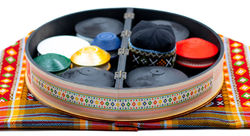Traditional games and activities play a crucial role in preserving culture, identity, and values, offering an interactive and experiential way for younger generations to connect with their roots. However, while some traditional Chin activities, such as Lai Paih (Chin wrestling) and Lailam (Chin traditional dances), still exist, they are typically confined to special cultural events and are not part of everyday life for Chin Americans, especially women: historically, women were not even allowed to enter the wrestling ring. And while Chin communities regularly engage in inclusive group sports like soccer and volleyball, they do little to reinforce Chin language and culture.
To address the lack of games that are both culturally meaningful and inclusive, I redesigned the traditional Chin game, Rualdih!, emphasizing Chin language, history, geography, and decorative patterns. By choosing the original Chin name Rualdih! (meaning "finished stacking"), rather than the Burmese-derived name Ttinbi, the game actively promotes linguistic identity and cultural authenticity. The game instructions are primarily in Laiholh (Hakha Chin), with English translations included to accommodate younger generations and non-Chin players, while retaining key terms like tomte (a cloth ball) and lungrual (wooden stacking pieces symbolizing unity). Visually, the game incorporates cultural symbolism: nine wooden pieces represent Chin State’s original townships, with colors reflecting the new Chin flag and four black pieces symbolizing sacred mountains. Stacked together, they form a cross atop a mountain, symbolizing faith and resilience, a motif repeated in the game's logo. Additionally, traditional Chin textile patterns adorn the game's components, including the cloth ball and carrying case, further celebrating Chin craftsmanship and heritage.

A TRADITIONAL CHIN GAME
Traditional games and activities have long been essential for preserving culture, values, and identity. For the Chin people, practices like Lai Paih (wrestling) and Lailam (dance) remain important, but they are often limited to special events and historically excluded women. In contrast, popular group sports like soccer and volleyball build community but do little to reinforce Chin language or cultural knowledge.
To bridge this gap, I redesigned the traditional Chin game Rualdih! (meaning “finished stacking”) as a culturally meaningful and inclusive experience. Choosing the original Chin name over the Burmese-derived Ttinbi affirms linguistic identity and authenticity. The game integrates Laiholh (Hakha Chin) instructions with English translations, ensuring accessibility while retaining key cultural terms such as tomte (cloth ball) and lungrual (stacking pieces symbolizing unity).
The visual system draws deeply on Chin heritage. Nine wooden pieces represent the townships of Chin State, their colors echoing the new Chin flag, while four black pieces honor sacred mountains. When stacked, they form a cross atop a mountain, symbolizing faith and resilience, echoed in the game’s logo. Traditional Chin textile patterns appear on the tomte and carrying case, celebrating Chin craftsmanship and connecting players to cultural aesthetics.
Now played in multiple Chin organizations across the United States, Rualdih! offers more than entertainment. It is a tool for language practice, cultural pride, and community connection through meaningful and engaging play.
PLAYTESTING
Rualdih! has been playtested with Chin communities across the United States and with players from other cultural backgrounds. Among Chin families, the game encouraged children to practice Chin vocabulary and sparked pride in cultural identity, while parents appreciated its educational value. Non-Chin players found the rules easy to learn and were drawn to the game’s patterns, symbols, and stories, which opened meaningful conversations about Chin heritage.
 |  |  |  |
|---|

Rualdih!, introducing and playtesting with the Chin Revival Church at a Chin cultural event, Irving, TX, 2023.

Introducing and playtesting Rualdih! with the Amarillo Chin Christian Church Youth Department, Amarillo, TX, 2024.

Introducing and playtesting Rualdih! with young Chin-Americans who speak mostly Chin and some English, Indiana Bethel Baptist Church Youth and Children department, Indianapolis, IN, 2023.

Introducing and playtesting Rualdih! with the mixed-nationality English-speaking MFA in Design graduate students, Austin, TX, 2024, picture by Edward McFarland-Catalan.

Introducing and playtesting Rualdih! with the mixed-nationality English-speaking MFA in Studio Art cohort, Austin, TX, 2024.




